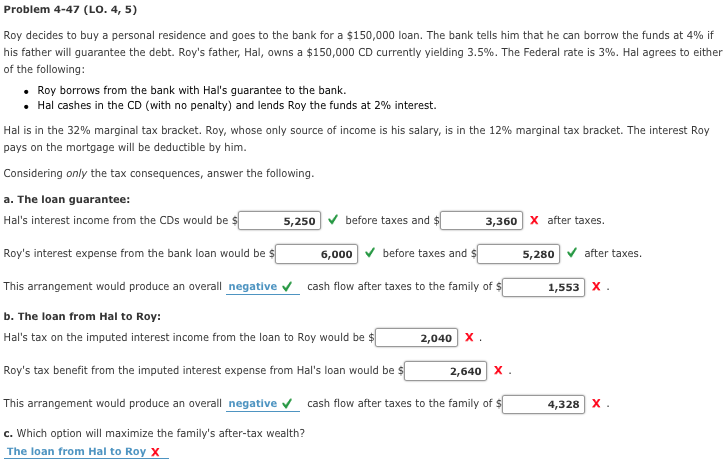a. The loan guarantee: Hal's interest income from the CDs would be $ Roy's interest expense from the bank loan would be $ This arrangement would produce an overall negative ✔ cash flow after taxes to the family of $ b. The loan from Hal to Roy: Hal's tax on the imputed interest income from the loan to Roy would be $ Roy's tax benefit from the imputed interest expense from Hal's loan would be $ 2,640 X This arrangement would produce an overall negative cash flow after taxes to the family of $ c. Which option will maximize the family's after-tax wealth? 5,250 before taxes and $ 6,000✔ before taxes and 2,040 X 3,360 X after taxes. 5,280✔after taxes. 1,553 X. 4,328 X.
a. The loan guarantee: Hal's interest income from the CDs would be $ Roy's interest expense from the bank loan would be $ This arrangement would produce an overall negative ✔ cash flow after taxes to the family of $ b. The loan from Hal to Roy: Hal's tax on the imputed interest income from the loan to Roy would be $ Roy's tax benefit from the imputed interest expense from Hal's loan would be $ 2,640 X This arrangement would produce an overall negative cash flow after taxes to the family of $ c. Which option will maximize the family's after-tax wealth? 5,250 before taxes and $ 6,000✔ before taxes and 2,040 X 3,360 X after taxes. 5,280✔after taxes. 1,553 X. 4,328 X.
Chapter5: Gross Income: Exclusions
Section: Chapter Questions
Problem 56P
Related questions
Question

Transcribed Image Text:Problem 4-47 (LO. 4, 5)
Roy decides to buy a personal residence and goes to the bank for a $150,000 loan. The bank tells him that he can borrow the funds at 4% if
his father will guarantee the debt. Roy's father, Hal, owns a $150,000 CD currently yielding 3.5%. The Federal rate is 3%. Hal agrees to either
of the following:
• Roy borrows from the bank with Hal's guarantee to the bank.
Hal cashes in the CD (with no penalty) and lends Roy the funds at 2% interest.
Hal is in the 32% marginal tax bracket. Roy, whose only source of income is his salary, is in the 12% marginal tax bracket. The interest Roy
pays on the mortgage will be deductible by him.
Considering only the tax consequences, answer the following.
a. The loan guarantee:
Hal's interest income from the CDs would be $
before taxes and $
6,000 ✓ before taxes and $
Roy's interest expense from the bank loan would be $
This arrangement would produce an overall negative ✓ cash flow after taxes to the family of $
b. The loan from Hal to Roy:
Hal's tax on the imputed interest income from the loan to Roy would be $
Roy's tax benefit from the imputed interest expense from Hal's loan would be $
2,640 X.
This arrangement would produce an overall negative cash flow after taxes to the family of $
c. Which option will maximize the family's after-tax wealth?
The loan from Hal to Roy X
5,250
2,040 X.
3,360 X after taxes.
5,280✔ after taxes.
1,553 X.
4,328 X.
Expert Solution
This question has been solved!
Explore an expertly crafted, step-by-step solution for a thorough understanding of key concepts.
This is a popular solution!
Trending now
This is a popular solution!
Step by step
Solved in 3 steps

Recommended textbooks for you

Individual Income Taxes
Accounting
ISBN:
9780357109731
Author:
Hoffman
Publisher:
CENGAGE LEARNING - CONSIGNMENT



Individual Income Taxes
Accounting
ISBN:
9780357109731
Author:
Hoffman
Publisher:
CENGAGE LEARNING - CONSIGNMENT


